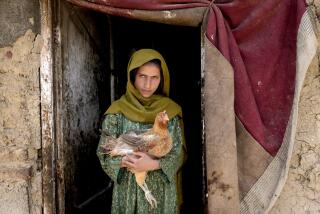Attempts to Form Interim Regime Degenerate Into Factional Strife : Split Dampens Rebel Joy as Soviets Leave Afghan War
- Share via
ISLAMABAD, Pakistan — Flanked by guards posing for the television cameras, a gray-bearded Afghan rebel leader proclaimed here Wednesday that the Soviet withdrawal from Afghanistan was “one of the most unprecedented events of the last few centuries” and that it “defeated communism’s philosophy all over the world as a whole.”
“Allah has given us the honor of breaking the chains of Red imperialism,” said fundamentalist rebel leader Abdul Rasul Sayyaf in his native Persian, as television crews, newspaper and radio reporters from throughout the world recorded his victory speech.
“It was the power of faith, the steadfastness, the will and the determination of the Afghan nation that forced the Russians to leave our country and change their habits,” he said.
There were no cheers from the rebels ordered to assemble at the religious camp here for what had been billed as a press conference by the Afghan rebel moujahedeen. There was no show of emotion.
It was a stage-managed event that belied the deep and growing divisions within the rebel movement to which the United States and Pakistan have given billions of dollars in arms and aid to help it drive the Soviet occupation troops out of Afghanistan.
By comparison, one senior diplomat here noted Wednesday night, the ceremony for the last Soviet soldier to cross Afghanistan’s border into Soviet territory Wednesday morning “was far more jovial than anything you’ll see over here.”
The desperate attempts of the past several weeks to convene a unified assembly of rebel leaders and form an interim government that could assume power in Kabul if Afghanistan’s Soviet-backed President Najibullah falls have degenerated into conflict among the rebel factions.
Fundamentalists and Moderates
One of the seven parties in the rebels’ political alliance has boycotted every session of the assembly. Representatives of the Afghan rebel groups based in Iran have refused to attend. Prominent rebel commanders and important tribal leaders have already left, and even the religious leaders, known as mullahs, who were present at the assembly Wednesday voiced strong dissent during the session.
Most of the disgruntled delegates blame the failure of the assembly, or shura, on the deepening split between the dominant fundamentalist parties and the moderates in the rebel alliance.
The fundamentalists are pushing a proposal to name a weak leader to head the government, which will continue to be dictated to by the seven party leaders, until elections can be held in Afghanistan within six months. Fundamentalist leader Ahmad Shah would be prime minister in the interim government.
The moderates object, and senior diplomats--even some who have supported the fundamentalists--agree that Ahmad Shah already has been “totally discredited.”
“As long as they keep pushing Ahmad Shah, the shura goes nowhere,” said one moderate. “As far as I’m concerned, I’m going to give an angry speech tomorrow and go home. Let them kill me if they like. The shura is finished anyway.”
At his press conference to mark the Soviet withdrawal, Sayyaf, who heads a fundamentalist rebel party financed by Saudi Arabia, angrily denied that there are any divisions among the moujahedeen.
“There is some kind of imagination as if the moujahedeen organizations are divided into two parts,” Sayyaf said through his translator. “This is a wrong impression.”
Reports of the fundamentalist-moderate split are “part of propaganda by the pessimists and the enemies of the holy war,” Sayyaf said.
Sayyaf did not comment, however, on the fact that when the rebel leaders invited questions from the press, the only two leaders on the stage were he and Gulbuddin Hekmatyar, who is considered the most fundamentalist of the alliance leaders.
Hope Seen in Alliances
Western diplomats and analysts who are following the shura closely have all but dismissed it as a credible body. Most said the hope for peace in the near future hinges on the ability of tribal leaders and regional commanders inside Afghanistan to forge alliances that will produce semi-autonomous governments.
“They are already forming unities inside,” one said. “Sub-tribes are reasserting their relationship with parent tribes. These are stepping stones to a loya jirga , the traditional assembly of elders that decides for the nation in times of crisis.
“Traditional leadership will now be paramount. The rebel commanders will have influence but it is influence that will be in a context. It is influence within the only thing they know--the tribe.”
Without a unified interim government to pressure Najibullah’s regular army, most Pakistani and Western analysts said they now believe that the fall of Kabul and other major cities will take much longer than the U.S. government originally had hoped.
“The Kabul regime is very strong, they are well-equipped and they will keep their morale up for some time,” said Kamal Matinuddin, a retired general and director of Pakistan’s Office of International Strategic Studies.
Matinuddin’s research indicates that the rebel commanders now have all major Afghan cities under siege, all key airports are under intermittent artillery attack, and all major highways and roads have been completely or partially block aded by the rebels.
But 25 of the 31 provincial capitals remain under the regime’s control, and morale throughout the hard core of Najibullah’s military and civilian support remains very high, he said.
He said the fighting will probably continue and that the moujahedee n will continue to harass the government forces.
Another analyst said: “But it is really a matter of penetrating as close as possible rather than fighting. And that kind of war takes time, a lot of time, and a lot of lives.”
More to Read
Sign up for Essential California
The most important California stories and recommendations in your inbox every morning.
You may occasionally receive promotional content from the Los Angeles Times.













